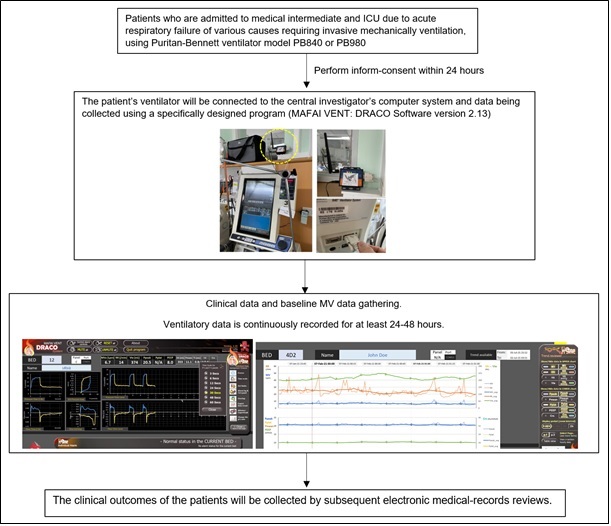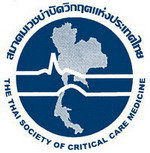The characteristics of the continuously-recorded mechanical power and its associated clinical outcomes in medical patients with respiratory failure (CORE POWER) study: The protocol of prospective observation study
DOI:
https://doi.org/10.54205/ccc.v30.254872Keywords:
Mechanical power, Ventilator-induced lung injury, Mechanical ventilation, Respiratory failure, Critically illAbstract
Background: The amount of energy delivered from the ventilator applied to the lungs within a given timeframe, is defined as mechanical power (MP). Recently, low MP is one of the new concepts in lung-protective ventilation strategies that may associate with survival benefit. However, measuring MP requires additional calculations not being carried-out in usual clinical care and the reports about MP were mostly a cross-sectional data. The real-time changes or dynamic data of MP was scarcely reported. Our objective is to investgate the association between the dynamic changes of MP and clinical outcomes in critically ill patients.
Methods: This will be a prospective, observational study performed in a single center. Adult patients admitted to medical intermediate and intensive care units who requiring invasive mechanical ventilation will be consecutively enrolled. The patients’ ventilators will be connected to the specific investigator’s computer system for continuously real-time data recording for at least 24 hours. The primary outcome is in-hospital mortality.
Hypothesis: We hypothesize that excessive mechanical power during mechanical ventilation contributes to ventilator-induced lung injury, thus real-time continuously mechanical power monitoring may reduce adverse events associated with mechanical ventilation.
Ethic: The study protocol has been approved by the Institution Review Board of Ramathibodi Hospital, Mahidol University, Thailand (No. MURA2021/680).
Trial registration: TCTR20220202010
Downloads
References
Pham T, Brochard LJ, Slutsky AS. Mechanical Ventilation: State of the Art. Mayo Clin Proc. 2017;92(9):1382-1400.
Slutsky AS, Ranieri VM. Ventilator-induced lung injury. N Engl J Med. 2013;369(22):2126-36.
Beitler JR, Malhotra A, Thompson BT. Ventilator-induced Lung Injury. Clin Chest Med. 2016;37(4):633-646.
Cressoni M, Gotti M, Chiurazzi C, et al. Mechanical Power and Development of Ventilator-induced Lung Injury. Anesthesiology. 2016;124(5):1100-8.
Gattinoni L, Tonetti T, Cressoni M, et al. Ventilator-related causes of lung injury: the mechanical power. Intensive Care Med. 2016;42(10):1567-1575.
Silva PL, Ball L, Rocco PRM, Pelosi P. Power to mechanical power to minimize ventilator-induced lung injury? Intensive Care Med Exp. 2019;7(Suppl 1):38.
Acute Respiratory Distress Syndrome Network, Brower RG, Matthay MA, Morris A, Schoenfeld D, Thompson BT, Wheeler A. Ventilation with lower tidal volumes as compared with traditional tidal volumes for acute lung injury and the acute respiratory distress syndrome. N Engl J Med. 2000;342(18):1301-8.
Sahetya SK, Brower RG. Lung Recruitment and Titrated PEEP in Moderate to Severe ARDS: Is the Door Closing on the Open Lung? JAMA. 2017;318(14):1327-1329. doi: 10.1001/jama.2017.13695.
Amato MB, Meade MO, Slutsky AS, Brochard L, et al. Driving pressure and survival in the acute respiratory distress syndrome. N Engl J Med. 2015;372(8):747-55.
Cressoni M, Gotti M, Chiurazzi C, Massari D, Algieri I, Amini M, et al. Mechanical Power and Development of Ventilator-induced Lung Injury. Anesthesiology. 2016;124(5):1100-8.
Serpa Neto A, Deliberato RO, Johnson AEW, Bos LD, Amorim P, et al. Mechanical power of ventilation is associated with mortality in critically ill patients: an analysis of patients in two observational cohorts. Intensive Care Med. 2018;44(11):1914-1922.
Zhang, Z.; Zheng, B.; Liu, N.; Ge, H.; Hong, Y. Mechanical power normalized to predicted body weight as a predictor of mortality in patients with acute respiratory distress syndrome. Intensiv. Care Med. 2019;45:856–864
Coppola S, Caccioppola A, Froio S, Formenti P, De Giorgis V, Galanti V, et al. Effect of mechanical power on intensive care mortality in ARDS patients. Crit Care. 2020;24(1):246.
Chiu LC, Lin SW, Chuang LP, Li HH, Liu PH, Tsai FC, et al. Mechanical power during extracorporeal membrane oxygenation and hospital mortality in patients with acute respiratory distress syndrome. Crit Care. 2021;25(1):13.
Costa ELV, Slutsky AS, Brochard LJ, Brower R, Serpa-Neto A, Cavalcanti AB, et al. Ventilatory Variables and Mechanical Power in Patients with Acute Respiratory Distress Syndrome. Am J Respir Crit Care Med. 2021;204(3):303-311.
Belliato M, Epis F, Cremascoli L, et al. Mechanical Power during Veno-Venous Extracorporeal Membrane Oxygenation Initiation: A Pilot-Study. Membranes (Basel). 2021;11(1):30.
Parhar, Ken Kuljit S et al. Epidemiology, Mechanical Power, and 3-Year Outcomes in Acute Respiratory Distress Syndrome Patients Using Standardized Screening. An Observational Cohort Study. Ann Am Thorac Soc. 2019;16(10):1263-1272.
Urner M, Jüni P, Hansen B, Wettstein MS, Ferguson ND, Fan E. Time-varying intensity of mechanical ventilation and mortality in patients with acute respiratory failure: a registry-based, prospective cohort study. Lancet Respir Med. 2020;8(9):905-913.
Giosa L, Busana M, Pasticci I, et al. Mechanical power at a glance: a simple surrogate for volume-controlled ventilation. Intensive Care Med Exp. 2019;7(1):61.

Downloads
Published
How to Cite
Issue
Section
License
Copyright (c) 2022 The Thai Society of Critical Care Medicine

This work is licensed under a Creative Commons Attribution-NonCommercial 4.0 International License.




